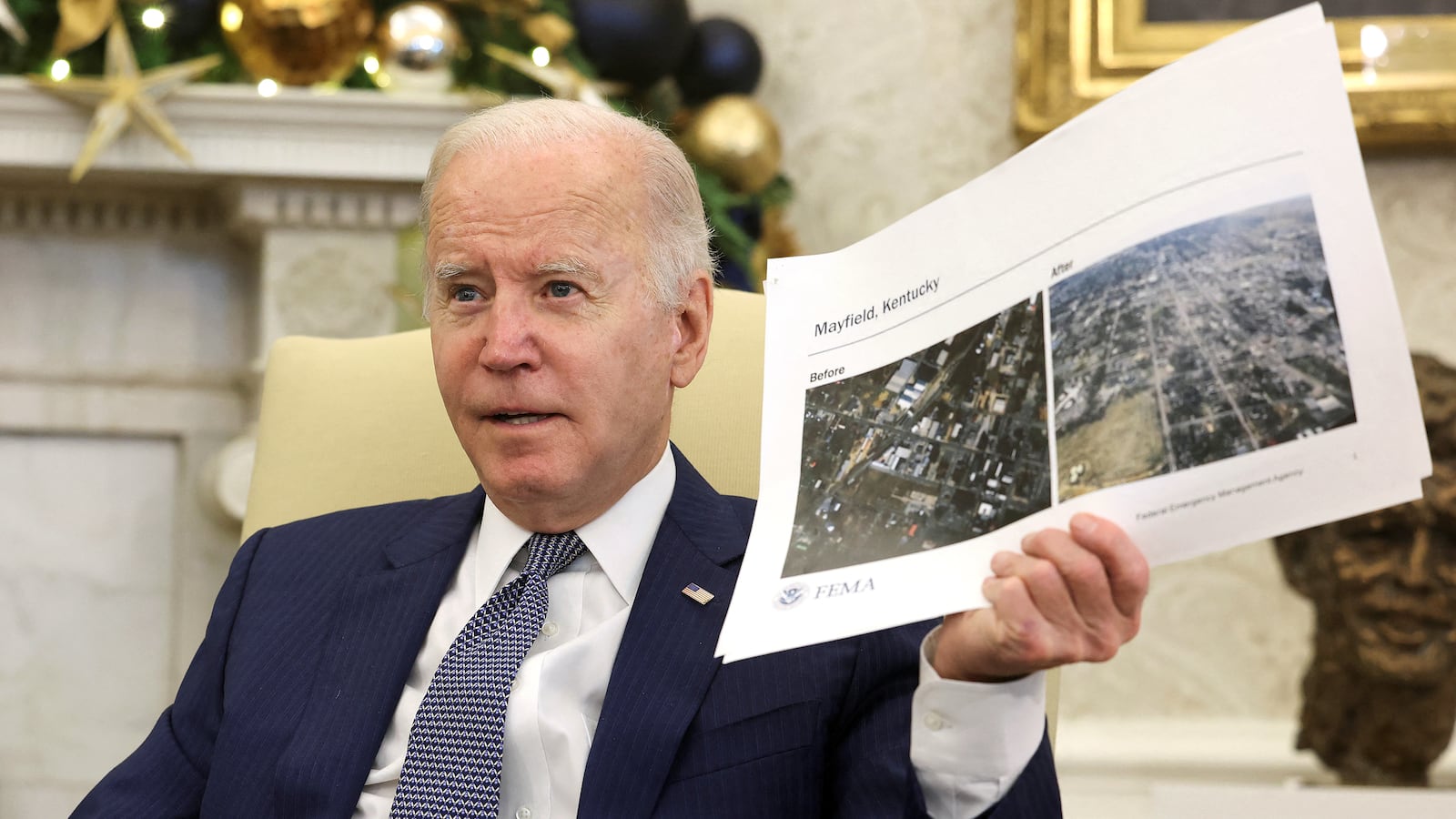The terrible damage done by tornados in six mostly red states gives President Biden a chance to promptly and efficiently deliver federal aid to Red America in a way that will hit home where rhetoric about the Build Back Better bill and what it would provide in the future have not.
Biden will be on the ground in Kentucky on Wednesday, visiting Mayfield and Dawson Springs, small rural communities leveled by the worst twister in the state’s history. “It’s an excellent way for him to prove he meant it when he said he’s president of all the people, not just the people who voted for him,” says Bill Galston with the Brookings Institution’s governance studies program.
The pattern is clear: “Presidents who deliver are rewarded, and those that don’t face electoral retribution.”
The Federal Emergency Management Agency has been in the crosshairs before, most famously when President George W. Bush said, “Brownie, you’re doing a heck of a job” even as FEMA Administrator Michael Brown wasn’t fully unaware of the extent of Hurricane Katrina’s damage. Bush’s job approval numbers plummeted after that, and never entirely recovered.
Thankfully, there’s a new FEMA administrator on the job. Her name is Deanne Criswell, and she’s the first woman to serve in the role. Appointed by Biden and confirmed unanimously by the Senate in late April, she has the credentials to lead an agency fighting on so many fronts in a time when climate change is wreaking havoc. She comes to the job from running New York City’s Office of Emergency Management and, before that, 21 years as a Colorado National Guard firefighter. She calls climate change “the crisis of our generation,” and urges more mitigation efforts to lessen future catastrophic events.
Her ability to marshal the needed resources will be put to the test. Disaster management can make or break a president, and Biden is at a crucial point where a further drop in his poll ratings would be disastrous while even the tiniest boost could pay dividends.
“Disasters are always horrible and heartrending but they also provide the opportunity for a reset,” says Matt Bennett with Third Way. “He can go out and deliver services in a way that’s visible and feels real, like a mayor. This is Joe Biden’s superpower, his empathy, he can help people manage their grief. He calls people, he follows up, he does things you don’t expect from a national politician. People love it and that’s a big part of his appeal.”
The contrast with his predecessor couldn’t be more stark. President Trump looked for ways to punish blue states where he could, and he opposed disaster funding for Puerto Rico in the wake of a devastating hurricane. When he grudgingly yielded and made a trip to the U.S. territory, he tossed rolls of paper towels into a crowd, a gesture that underscored his low regard for people who he didn’t think supported him. The Washington Post reported in 2019 that he told top aides “that he did not want a single dollar going to Puerto Rico. Instead, he wanted more of the money to go to Texas and Florida,” states that were his strongholds.
The two President Bushes, father and son, are case histories in FEMA failures. When Hurricane Andrew struck South Florida in August of 1992 while the senior Bush was running for re-election, he didn’t immediately realize its magnitude. After four days when the area was still without food, water and shelter, Bush made the decision to send in federal troops while he was between campaign stops in the Midwest. His inattention provided the template for challenger Bill Clinton to win the November election against a president who seemed out of touch.
Andrew Reeves, a political science professor at Washington University in St. Louis, has done research that quantifies how presidents benefit when they respond to natural disasters, “about a half a point boost in their county-level share when they issued a declaration months before an election.” He emailed a photo of President Obama, “often accused of being aloof—comforting a Jersey citizen after (Hurricane) Sandy.”
He believes the logic holds even when an election is not imminent, and that Biden promising federal aid to workers in Kentucky and the other states will create goodwill and “likely give him a modest boost in the affected areas which could help him with Build Back Better. But the boost won’t last forever, and it’s not as if the congressional extremists will suddenly roll over for whatever the president wants.”
When Biden tours the damage in Kentucky on Wednesday, will Republican Senate leader Mitch McConnell be there with him? In normal times, when a president visits the site of a natural disaster, members of Congress want to be there to show they care, and to showcase their role in securing the impending largesse. McConnell may want to avoid a “Chris Christie moment,” a hug with Obama that the New Jersey governor got punished for by his party.
“Or he might say politics stops at a tornado and he’ll be there,” says Third Way’s Matt Bennett. Either way, Biden will be there making his case in a time of shared grief and as president of all the people.








